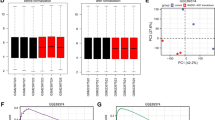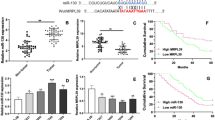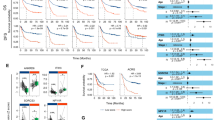Abstract
The aim of the research is to determine whether c2orf68 gene plays a role in the carcinogenesis of human colorectal cancer and to study the function of c2orf68 belonging to the UPF0561 family. The mRNA expression levels of c2orf68 were examined in 30 pairs of human colorectal adenocarcinoma tissues and adjacent normal colorectal tissues by qRT-PCR. The SW480 and SW620 cell lines were transfected with siRNA against the c2orf68 gene and set gene. The expressed mRNA levels of Akt, PI3K, Bax, Bcl-2, caspase3, c-Myc, cyclinD1, pp2a and set were determined by qRT-PCR, and the protein levels of C2ORF68, c-Myc, PP2A and SET were examined by Western blot. Cell proliferation was tested by MTT assay, and apoptosis and cell cycle were studied by flow cytometry. Cancer metastasis assay was performed by transwell chamber. The c2orf68 mRNA expression was down-regulated in 63.33 % of the cancer samples, and a positive correlation was found between the mRNA expression of c-Myc and pp2a that of c2orf68. Meanwhile, there was a negative correlation between the mRNA expression of c2orf68 and set. The c2orf68 mRNA was significantly down-regulated in SW480−c2orf68 and SW620−c2orf68 cells. The inhibitory rate in the two cell lines was, respectively, 65.2 and 71.6 % by qRT-PCR. A 22.7 % inhibition on cell proliferation in SW480−c2orf68 cells and a 21.2 % inhibition in SW620−c2orf68 cells were observed using the MTT assay. Flow cytometry analysis indicates that the cell apoptosis rate was 21.42 % in SW480−c2orf68 cells and 17.78 % in SW620−c2orf68 cells, whereas the percentage of G1 phase cells was 61.8 and 58.6 % in SW480−c2orf68 and SW620−c2orf68 cells, respectively. In addition, the mRNA expression of set and Bax was up-regulated after c2orf68 interfered in SW480−c2orf68 and SW620−c2orf68 cells, whereas that of Bcl-2, c-Myc, cyclinD1, caspase3 and pp2a was down-regulated. Consistent with the mRNA results, the protein expression of C2ORF68, PP2A and c-Myc was down-regulated, whereas that of SET was up-regulated. Our data thus suggest that c2orf68 promotes carcinogenesis through the regulation of mammalian target of rapamycin signaling pathway.










Similar content being viewed by others
References
Herrinton LJ, Liu L, Levin TR, Allison JE, Lewis JD, Velayos F. Incidence and mortality of colorectal adenocarcinoma in persons with inflammatory bowel disease from 1998 to 2010. Gastroenterology. 2012;143:382–9.
Jemal A, Bray F, Cente MM, Ferlay J, Ward E. Forman D: global cancer statistics. CA Cancer J Clin. 2011;61:69–90.
Zhang C, Chen Y. Electronic cloning and validating of the suppression subtractive hybridization EST ES274070 of human colorectal adenocarcinoma. US Chin J Lymph Oncol. 2007;6:83–8.
Chen Y, Zhang Y, Zhou Z, Wang G, Yi Z. Identification of differentially expressed genes in human colorectal adenocarcinoma. World J Gastroenterol. 2006;12:1025–32.
Wang K, Chen Y. Analysis of a novel protein in human colorectal adenocarcinoma. Med Rep. 2013;8:529–34.
Wen X, Dong L, Zhu J, Chen Y. c2orf68 is upregulated by rapamycin treatment in human colorectal adenocarcinoma cells. Mol Med Rep. 2013;7:1257–60.
Jiang Q, Zhang C, Zhu J, Chen Q, Chen Y. The set gene is a potential oncogene in human colorectal adenocarcinoma and oral squamous cell carcinoma. Mol Med Rep. 2011;4:993–9.
Wen X, Chen Y. Expression of set is downregulated by rapamycin in human colorectal cancer cells. Biom Rep. 2013;1:727–30.
Bustin SA, Benes V, Garson JA, et al. The MIQE guidelines: minimum information for publication of quantitative real-time PCR experiments. Clin Chem. 2009;55:611–22.
Jiang Q, Zhang C, Chen Y. NM_001013649.3 gene is down-regulated in human colorectal adenocarcinoma. Mol Med Rep. 2011;4(6):1279–81.
Leng Q, Wu KL, Jin P, et al. Distribution characteristics of colorectal neoplasm in 4,450 patients and implication for colorectal cancer screening. Zhonghua weichang zazhi. 2010;13(11):822–4.
Li M, Li JY, Zhao AL, et al. Do young patients with colorectal cancer have a poorer prognosis than old patients? J Surg Res. 2011;167(2):231–6.
Arroyo JD, Hahn WC. Involvement of PP2A in viral and cellular transformation. Oncogene. 2005;24(52):7746–55.
Medema RH, Kops GJ, Bos JL, et al. AFX-like Forkhead transcription factors mediate cell-cycle regulation by Ras and PKB through p27kip1. Nature. 2000;404(6779):782–7.
Rssig L, Jadidi AS, Urbich C, et al. Akt-dependent phosphorylation of p21Cip1 regulates PCNA binding and proliferation of endothelial cells[J]. Mol Cell Biol. 2001;21(16):5644–57.
Jung P, Menssen A, Mayr D, Hermeking H. AP4 encodes a c-MYC-inducible repressor of p21. Proc Natl Acad Sci USA. 2008;105:15046–51.
Willert K, Shibamoto S, Nusse R. Wnt-induced dephosphorylation of axin releases beta-catenin from the axin complex. Genes Dev. 1999;13:1768–73.
Karch J, Kwong JQ, Burr AR, et al. Bax and Bak function as the outer membrane component of the mitochondrial permeability pore in regulating necrotic cell death in mice. Elife. 2013;27(2):e00772.
Kluck RM, Bossy-Wetzel E, Green DR, Newmeyer DD. The release of cytochrome c from mitochondria: a primary site for Bcl-2 regulation of apoptosis. Science. 1997;275:1132–6.
Uchiyama T, Engelman RM, Maulik N, Das DK. Role of Akt signaling in mitochondrial survival pathway triggered by hypoxic preconditioning. Circulation. 2004;109:3042–9.
Chu IM, Hengst L, Slingerland JM. The Cdk inhibitor p27 in human cancer: prognostic potential and relevance to anticancer therapy. Nat Rev Cancer. 2008;8:253–67.
Roy HK, Olusola BF, Clemens DL, Karolski WJ, Ratashak A, Lynch HT, Smyrk TC. AKT proto-oncogene overexpression is an early event during sporadic colon carcinogenesis. Carcinogenesis. 2002;23:201–5.
Eisenman RN. Deconstructing myc. Genes Dev. 2001;15:2023–30.
Eilers M, Eisenman RN. Myc’s broad reach. Genes Dev. 2008;22:2755–66.
Blackwood EM, Eisenman RN. Max: a helix-loop-helix zipper protein that forms a Markus Hartl and Klaus Bister sequence-specifi c DNA-binding complex with Myc. Science. 1991;251:1211–7.
Dang CV. c-Myc target genes involved in cell growth, apoptosis, and metabolism. Mol Cell Biol. 1999;19:1–11.
Johnson SM, Gulhati P, Rampy BA, et al. Novel expression patterns of PI3K/AKT/mTOR signaling pathway components in colorectal cancer. J Am Coll Surg. 2010;210:767–78.
Yan D, Avtanski D, Saxena NK, Sharma D. Leptin-induced epithelial-mesenchymal transition in breast cancer cells requires β-catenin activation via Akt/GSK3- and MTA1/Wnt1 protein-dependent pathway. J Biol Chem. 2012;287(11):8598–612.
Mayo LD, Donner DB. A phosphatidylinositol 3-kinase/Akt pathway promotes translocation of Mdm2 from the cytoplasm to the nucleus. Proc Natl Acad Sci USA. 2001;98(20):11598.
Henshall DC, Araki T, Schindler CK, et al. Activation of bcl-2 associated death protein and counter-response of Akt within cell populations during seizure-induced neuronal death. Neurosci. 2002;22(19):8458.
Acknowledgments
This study was supported by the research funds from the Project of Sichuan Science and Technique (2014SZ0002-14).
Author information
Authors and Affiliations
Corresponding author
Rights and permissions
About this article
Cite this article
Wen, X., Zhu, J., Dong, L. et al. The role of c2orf68 and PI3K/Akt/mTOR pathway in human colorectal cancer. Med Oncol 31, 92 (2014). https://doi.org/10.1007/s12032-014-0092-7
Received:
Accepted:
Published:
DOI: https://doi.org/10.1007/s12032-014-0092-7




